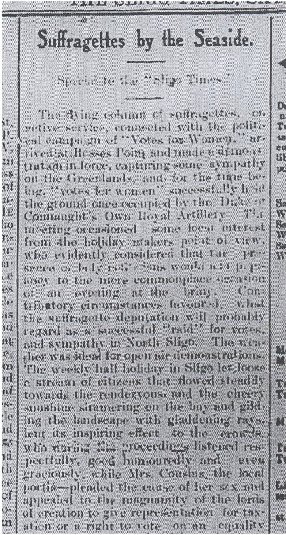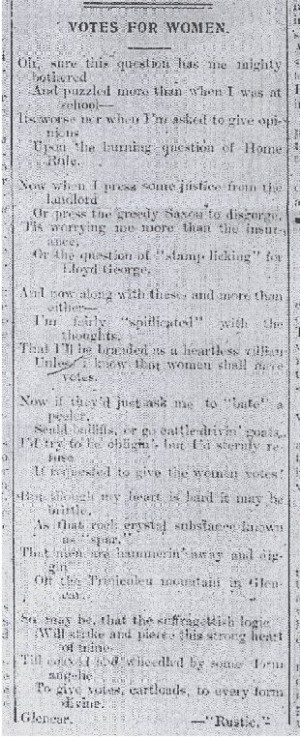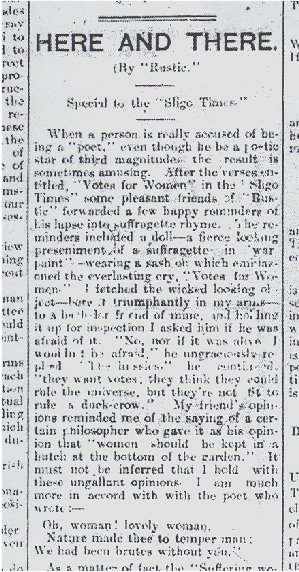Main menu:
Sligo Poets 1912-1923
Votes for Women
Sligo Newspapers > Sligo Times

The Irish Parliamentary Party did not support the demand for female suffrage and helped defeat the 1912 Parliamentary Franchise (Women) Bill.
There was some suffrage activity in Sligo during 1912 and 1913. Olga Crichton (1864-1948), wife of Church of Ireland landowner Alex Crichton, was involved in a Sligo branch of the Irish Women’s Franchise League (IWFL) in 1912 which held outdoor meetings and talks sold the Irish Citizen, the Irish suffrage newspaper, on Saturdays in Sligo town. Margaret Cousins (1878-1954) was one of the IWFL’s founders, a native of Boyle, County Roscommon and a frequent speaker at Sligo meetings.
Lady Louisa Crofton, wife of Malby Crofton, formed a Sligo Propaganda Society for Women’s Suffrage which distributed literature. In 1913 Olga Crichton left the IWFL and founded a Sligo Suffrage Society which affiliated with the non-militant Irishwomen’s Suffrage Federation. Lady Crofton became president of this society which continued to hold meetings at Rosses Point during summer 1913 featuring prominent speakers from Ireland and Britain.
The Sligo Times and Sligo Independent regularly reported the Sligo group’s activities and complimented them on their non-violent actions, contrasting it with the more sensational actions of other Irish and English suffragettes.
The report (right) on Suffragettes by the Seaside was written by "Rustic" who was a regular special correspondent to the Sligo Times. He lived in Glencar, County Leitrim.
At the end of the report he says he decided to write the poem "Votes for Women" as a result of the meeting. The meeting addressed by Margaret Cousins was one in a regular series held at Rosses Point during the summers of 1912 and 1913 on Wednesday, the Sligo half-holiday.
The use of the phrase "flying column" is interesting in light of its later use during the war of independence.

Sligo Times 13 July 1912

VOTES FOR WOMEN.
Oh, sure this question has me mighty bothered
........And puzzled more than when I was at school—
Its worse nor when I’m asked to give opinions
........Upon the burning question of Home Rule.
Now when I press some justice from the landlord
........Or press the greedy Saxon to disgorge,
’Tis worrying me more than the insurance,
........Or the question of “stamp licking” for Lloyd George.
And now along with these and more than either—
........I’m fairly “spiflicated” with the thoughts,
That I’ll be branded as a heartless villain
........Unless I know that women shall have votes.
Now if they’d just ask me to “bate” a peeler,
........Scald bailiffs, or go cattle-drivin’ goats,
I’d try to be obligin’, but I’d sternly refuse
........If requested to give the women votes!
But though mu heart is hard it may be brittle,
........As that rock crystal substance known as “spar,”
That men are hammerin’ away and diggin’
........Off the Triniculeu mountain in Glencar.
So. may be, that the suffragettish logic
........Will strike and pierce this strong heart of mine,
Till coaxed and wheedled by some form angelic
........To give votes, cartloads, to every form divine.
Glencar .....................................................—“Rustic.”
The reference to Lloyd George stamp licking refers to the recently introduced national insurance scheme which involved the use of insurance stamps.
This measure, passed in 1911, established compulsory health and unemployment insurance schemes. It attracted much opposition from those with vested interests and for a time there was an organised anti-stamp licking campaign.
In Sligo the Unionist landowner and politician, Bryan Cooper, was brought before the court for refusing to operate the new scheme.
"Triniculeu mountain in Glencar" is the place marked Treanakilew in maps. Barytes, also know as spar, was mined at many sites in the Benbulben area.
In the Sligo Times 24 August 1912, "Rustic", in an "Here and There" column mentions the response to his Votes for Women poem. (Extract right).
